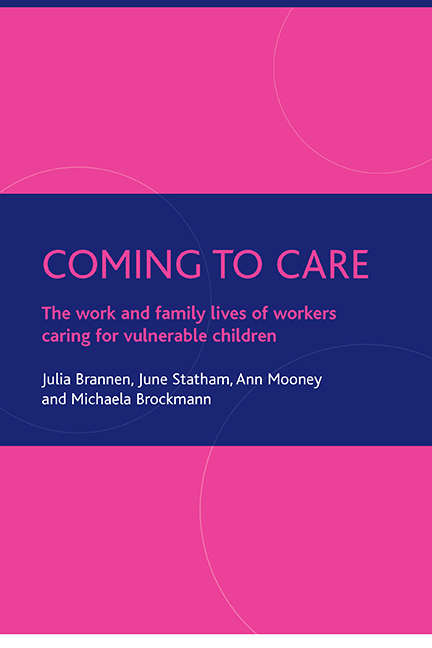Book contents
- Frontmatter
- Contents
- List of tables and boxes
- Acknowledgements
- one Setting the scene
- two The study
- three The origins of a care ethic in care workers’ childhoods
- four Entering care work with vulnerable children
- five Care workers’ careers and identities: change and continuity
- six What do vulnerable children need? Understandings of care
- seven Experiences of care work
- eight Leavers, movers and stayers
- nine Managing care work and family life
- ten Conclusions and policy implications
- Appendix: Boxes and additional tables
- References
- Index
five - Care workers’ careers and identities: change and continuity
Published online by Cambridge University Press: 15 September 2022
- Frontmatter
- Contents
- List of tables and boxes
- Acknowledgements
- one Setting the scene
- two The study
- three The origins of a care ethic in care workers’ childhoods
- four Entering care work with vulnerable children
- five Care workers’ careers and identities: change and continuity
- six What do vulnerable children need? Understandings of care
- seven Experiences of care work
- eight Leavers, movers and stayers
- nine Managing care work and family life
- ten Conclusions and policy implications
- Appendix: Boxes and additional tables
- References
- Index
Summary
Introduction
In this chapter we take up the story of care workers’ careers from the point at which they first entered childcare, the focus of Chapter Four. We take the term ‘career’ to mean an individual's progression in paid work over the lifecourse and how it interacts with their other careers, for example the career of parenthood (Elder, 1978). Career as a term also has other connotations. As Rose (2004) has found, the popular notion grew dramatically in Britain between 1986 and 2002, in some cases replacing the word ‘job’ in employment opportunities advertisements. The popularity of this self-perception increased more among women (from 39% to 54%) than among men, including among part-time workers, with the steepest rise among those with no qualifications (23% to 36%) and those in the bottom of the occupational status hierarchy (where many care workers are located). As Rose suggests, the popularity of the term is surprising among those whose advancement is less likely.
Paradoxically, the growth in popularity of the term ‘career’ as applied to employment has occurred at a time of considerable change in the world of work. The 1990s have been described in terms of growing job insecurity and rapid change in the nature of work in which jobs for life are no longer guaranteed. As researchers have suggested (see, for example, the national survey findings of White et al, 2004) the disappearance of what has been called a male model of work needs to be seen in context, for example for some groups casual and self-employment have been longstanding features of the labour market while many jobs remain little changed. On the other hand, with the privatisation of public services, moving into the private sector may mean a significant diminution in the quality of employment conditions. Whatever the ‘truth’ about the changes in employment, the growth in popularity of the term ‘career’ needs exploring.
One important change that underpins the growth in popularity of the term is the growth of credentialism and paper qualifications. This growth stands in contrast to the idea of career as a vocation or calling, the latter being premised on experience gained in the course of working in a particular occupation rather than on qualifications per se. Today's young people are expected to spend long periods in education.
- Type
- Chapter
- Information
- Coming to CareThe Work and Family Lives of Workers Caring for Vulnerable Children, pp. 77 - 102Publisher: Bristol University PressPrint publication year: 2007

